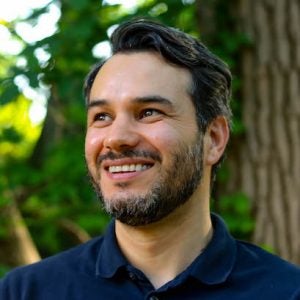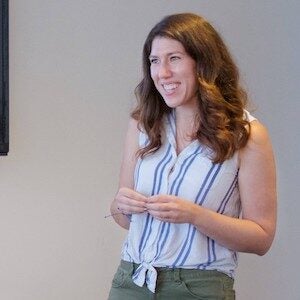The Inclusive SciComm Symposium (ISCS), in collaboration with Pueblo, seeks to be in solidarity and community with those who are on the forefront of advancing and realizing equity. With support from the Simons Foundation, the Community Cohort is a network of community-driven practitioners who come together to explore science communication and the many intersecting pathways for building equitable relationships and collaborations. This initiative aims to support community-developed knowledge, alignment, and action. This year, as part of the invitation to join the Community Cohort, organizations could also invite one of their community partners to participate in the experience together. This model is an effort to recognize and deepen existing community relationships, while providing opportunities for shared learning within the Cohort and across the ISCS community of practice.
The Inclusive SciComm Community Cohort initiative aims to:
- Sincerely recognize and shine a spotlight on the contributions of individuals and organizations that work within and as part of communities,
- Provide an opportunity for community engagement practitioners to connect with each other and with the growing Inclusive SciComm movement,
- Highlight the knowledge, strategies, and lessons of community engagement practitioners, activists, and organizers that can help science communicators shift their approaches with justice in mind,
- Create relevant and meaningful connections between adjacent efforts that can help advance the Cohort members’ work.
2023 Community Cohort Members
Jackie Dias (she/hers) is currently a River Conservation Fellow with the National Park Service Partnership Wild and Scenic Rivers program. Prior to her fellowship, Jackie earned a Master of Science in Environmental Conservation with a focus on Environmental Policy and Human Dimensions from the University of Massachusetts Amherst. Her researched focused primarily on economic and ecosystem service contributions of forests participating in the Forest Service Forest Legacy and Forest Stewardship Programs. Jackie has a strong passion for community conservation, land access, outdoor equity, and science communication. In her spare time, she is the co-founder and co-Program Coordinator for the Latino Outdoors Western Massachusetts team. Here, she encourages Latine families and individuals to comfortably and confidently recreate outdoors in a welcoming atmosphere. Outside of her work, you can find Jackie taking walks with her partner and pup, playing video games, baking, or cuddling with her cat, Luna.
Sebastian Moreno (he/his) is an Environmental Conservation Ph.D. Candidate at the University of Massachusetts – Amherst and Co-Program Coordinator for the Western Massachusetts Latino Outdoors chapter. Sebastian combines his interests in urban ecology and ornithology with engaging people in nature. He wants to empower people to advocate for themselves and their community. One way people can feel empowered is through citizen science and by increasing access to information about their communities.
Rafa Tapia (she/hers/ella) is the Senior Manager of Theory + Practice programming at STEM to the Future. Her work focuses on holding space for Black and Brown youth as they recognize their power and become active advocates and agents of change in their communities.
Matyos Kidane (he/him) is a Tigrayan immigrant and life long
Angeleno, serving as the Organizing Director for the
Stop LAPD Spying Coalition. Matyos’ work is
concerned with the achievement of Black liberation
and the abolition of policing.
Jo Ayuso (she/they) is a connector and community builder. She spends most of her time providing BIPOC youth outdoor experiences focused on sharing knowledge and joy in connection to the land. They are also a IDEI consultant to the PVD Tree Plan, a member of collectives that advocate for Environmental Justice for black and brown communities in Providence, Rhode Island, and truth-speaker to those in power. They are the Executive Director and Founder of Movement Education Outdoors.
Jeffrey Yoo Warren (he/him) is a Korean American artist-educator, community scientist, illustrator, and researcher in Providence, Rhode Island, who collaboratively creates community science projects that decenter dominant culture in environmental knowledge production. His recent work combines ancestral craft practices and creative work with diasporic memory through virtual collaborative worldbuilding. Jeff is an educator with Movement Education Outdoors and AS220, and part of the New Old art collective with Aisha Jandosova, hosting art-making and storytelling events with older adults; he is also the 2023 Innovator in Residence at the Library of Congress. His current artistic practice investigates how people build identity and strength through their interactions with artifacts and histories, and the ways that objects can tell stories that people can be part of in the present.
María José Gutiérrez Paz (she/hers/ella) was born in Santa Cruz de la Sierra, Bolivia. She studied hotel and tourism administration with a focus on higher education for her undergraduate degree. After working as a Spanish teacher in France and a French to Spanish interpreter and as a tour guide for French-speaking visitors and during international festivals, she co-founded the first International Institution of Santa Cruz in the USA: ̈ Damas Cívicas CruceñaS – U.S.A. ̈ working together with “cruceñas” women affiliated from different states, in order to help in projects that favor the neediest in her hometown. She moved to the USA in 2019 and now works as Co-Facilitator of the Woonasquatucket River Watershed Council’s Community program, New Voices and Champions of Climate Combat, or Nuevas Voces, based in Providence, Rhode Island.
Jenny Mercado (She/Her/Ella) is a Nicaragua Latina, woman, mother and professional who has been in the health field for lover 14 years. Ms. Mercado is a Certified Nursing Assistant (CNA) at Hasbro Children’s Hospital, Lifespan, located in Providence, Rhode Island, working in the Emergency Pediatric Department. She is considered a leader and go-to-person because of all the resources she has to offer to this community. In addition, Ms. Mercado is the founder and Director of Hermandad por Nicaragua, a non-profit organization that aims to connect new Nicaraguans to the United States who are in need of services such as housing, education, and career/employment. Ms. Mercado participated in the Woonasquatucket River Watershed Council (WRWC) Nuevas Voces Program in 2020 as a resident of the neighborhood of Olneyville in Providence, RI. Upon graduation, Jenny became a Co-Facilitator of the Nuevas Voces Program and now co-leads the program part time for WRWC. She has been able to unite forces with Brown University to develop a new resourceful web-link to communicate across networks that would allow the community to have a better understanding of the resources according to their neighborhood. This is an on-going project hoping to launch soon by the name of VECINA.
Alejandro Amador (he/his) says, “Raised in Tijuana and moving to San Diego when I was 12 years old made me face the culture, challenges and privileges of both sides of the US-Mex border. After graduating from San Diego State and joining Casa Familiar in 2018, I grew a deeper understanding of environmental justice, and the intricate socioeconomic dynamic of the border region. As the Environmental Programs Manager, I oversee the efforts to address social and environmental inequities within San Diego, and the unique and specific needs of the border community. Through my work, I have led and participated in advocacy for equitable & accessible transportation, climate action policy, strategies to reduce pollution in our communities, greening campaigns, and enhancement of public spaces. In my time off I love to travel, even if it’s a brief nearby trip, and trying new foods. ”
Breny Aceituno (she/hers/ella). As a child of undocumented immigrants and raised by a single mother, Breny Aceituno grew up in the heart of Los Angeles with the feeling of “ni de aqui, ni de alla.” In English, this means ‘not from here, not from there.’ Her Honduran roots were ubiquitous in her mother’s apartment, but outside those walls, she didn’t see much of what she thought made up her identity. This, of course, meant she often wrestled with questions of identity and belonging. Today, this experience informs her work as a community health advocate. She is currently a program director of the Institute for Public Strategies (IPS), working to disarm the health disparities in Latino communities near the San Diego border. She strives to ensure that all community members champion their diverse backgrounds as well as welcome the experiences of others. So much so that she now believes in the power of being from many places or, to use the Spanish idiom, “Soy de aqui, y de alla.” With this mindset, Breny is evermore inspired to advocate for communities where everyone can access community information in their chosen language and through their cultural lens. She believes this type of access will make it so that we can all make healthy, informed decisions with long-lasting effects on our mental and physical wellness. Breny graduated from UCLA with a bachelor’s in Political Science. She earned a master’s in Conflict Management from the University of Haifa in Israel. She has a passion for conflict management, investigative journalism, creative multimedia, storytelling, and all the wonders often unmasked in places of dichotomies (i.e., border towns, conflict zones, and isolated communities).
Organizers
Daniel Aguirre and Stacey Baker of Pueblo Consulting organize and implement the Community Cohort experience.


The Community Cohort is generously supported by the Simons Foundation.

